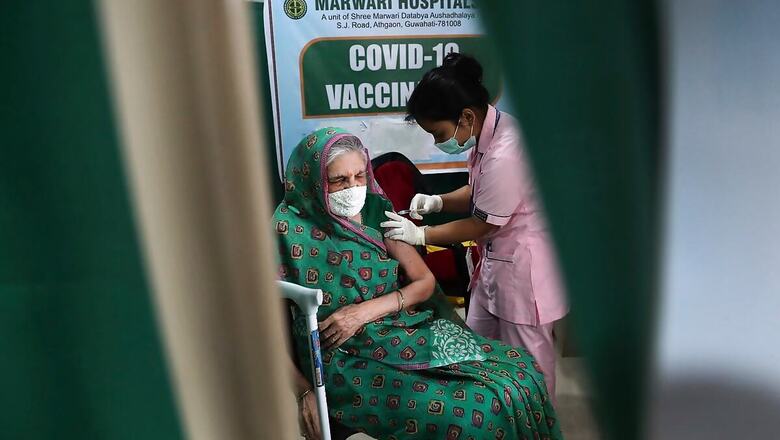
views
As we entered 2021, although it appeared the COVID situation was improving, the recent sudden surge in cases caught health systems and people unprepared. For a vast majority, the second wave has hit closer to home with friends and family members testing positive. This has affected the psychological well-being of everyone, in particular, the elderly.
For many elderly, life has turned upside down as they have prematurely lost their children or younger family members to COVID in an unnatural turn of events. Social rituals provide a means to share grief and gain support from friends and families during death, but inability to attend last rites has resulted in a lack of closure, adding to grief and pain. As one 74-year old senior citizen describes: during the first wave of the pandemic, news reports were about infected people dying. During the second wave, loved ones have died.
Challenges Faced by the Elderly
Although the preferred living arrangement in India among adults above 60 years is living with a spouse and children, 6 per cent of the elderly, and around 9 per cent of elderly women live on their own, without support of friends or family on a regular basis. The second COVID wave has been particularly harsh on them. Many have pre-existing medical conditions and reports of unavailability of hospital beds, or timely medical support, struggles for oxygen and increasing COVID-related deaths have instilled fear and anxiety even as they grapple with the entire situation.
ALSO READ | Lost a Loved One to COVID? Here’s How You Should Break the Bad News to Your Child
State lockdowns and travel restrictions as well as concerns regarding COVID exposure mean several are unable to travel to their children or their children have been unable to visit them, further adding to their daily struggles and increasing loneliness. As a resort, many children with parents in their 60s and above are remotely managing delivery of groceries, food and medication while checking in on their well-being through phone and video calls, in the process, teaching their parents to become more technology-savvy.
The COVID Impact on Mental Health
According to the Longitudinal Aging Study in India (LASI Wave 1 India report 2020), which examined health data for the elderly across India, 20 per cent of the elderly suffer mental health problems. In a survey conducted by Samvedna Senior Care after the first wave of the pandemic last year, with adults over 40 years to understand the impact of COVID on mental health and well-being, 66 per cent reported experiencing more than one symptom of psychological distress. Of individuals experiencing distress, a staggering 86 per cent said their mood was low and 83 per cent said they found it hard to find purpose in their lives or enjoy their daily activities. A further 58 per cent reported constantly feeling strained due to the lockdown. Sleep difficulties are also related to anxiety and depression and 33 per cent said they were facing sleep-related difficulties in recent months. These findings show how the COVID pandemic has increased psychological distress among older adults. However, seeking help remains a taboo. Only 22 per cent of the individuals surveyed said they would consider speaking with a mental health professional—this highlights the stigma that exists around mental health.
Challenges with getting vaccines and medical support have been a cause for increased anxiety and a feeling of helplessness in the current scenario. As a senior citizen describes, “There is extreme fear and hopelessness that you might not end up getting what you actually want. That kind of despondency is there.” A care-giver said her father-in-law is showing signs of depression and has become more withdrawn during the second wave.
Lending a Helping Hand
Several older adults are embarrassed to talk about mental health issues and accept low mood, anxiety and fear as a part of their life, brought on by a change in circumstances. They also worry they may be judged or fear becoming a burden on their family by disclosing their feelings. This further increases their sense of isolation and loneliness that impacts mental wellbeing. Ignoring mental health comes at a cost and can lead to increased risk of psychiatric conditions like depression, can impact physical health and reduce ability to live independently.
ALSO READ | What Parents Must Watch Out for: COVID Symptoms & Pandemic Effect on Kids’ Mental Health
For example, while loneliness in itself is not considered an illness, it has been shown to be an independent risk factor associated with death. Scientific studies have also shown that loneliness is related to a 32 per cent increase in risk of stroke and 40 per cent increase in risk of dementia. People who are lonely are also more likely to have difficulty managing their daily activities. Therefore, as the COVID situation improves, it is important that we prioritize mental health, to help older adults cope with the impact the pandemic has had on their lives.
A silver lining, if there is one to look for in the pandemic, is that elderly are becoming more comfortable and open to utilizing tele health. This has a huge advantage when it comes to breaking the stigma associated with seeking support for mental health-related issues. Tele health consultations allow people to talk about their challenges in confidentiality and provide support through mental health professionals, in the comfort of their homes. Fear, anxiety and loss of loved ones during the second wave of the COVID pandemic have definitely impacted everyone, but the elderly even more so. As a society, it is imperative that we prioritize mental wellbeing of older adults and encourage them to seek support as normal life resumes.
Read all the Latest News, Breaking News and Coronavirus News here.




















Comments
0 comment